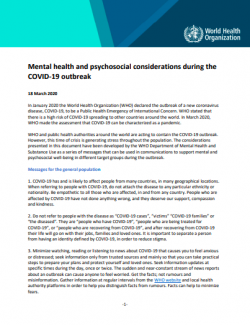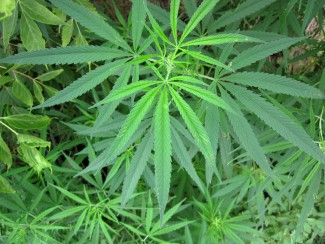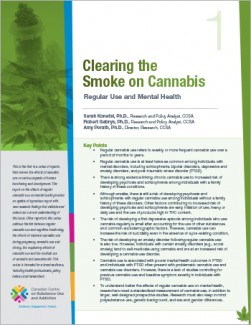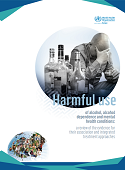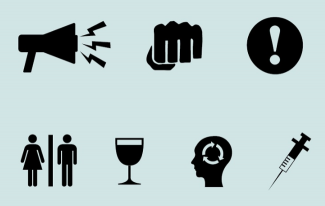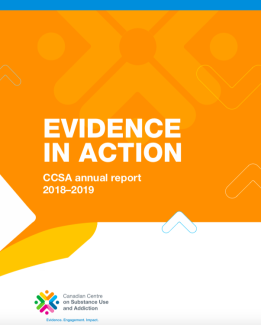Search
The Self-Care Matrix: A Unifying Framework for Self-Care
We are seeing a global rise in long-term noncommunicable diseases, linked with our inability to protect our own wellbeing.
The World Health Organization defines self-care as:
"the ability of individuals, families and communities to...
Self‐Care for the Prevention and Management of Disease: A Statement for Healthcare Professionals
Due to the nature of their work, health care professionals frequently experience long hours, stress, burnout and compassion fatigue. If left unaddressed, these issues can lead to increased risks of mental and physical health problems.
One...
Mental Health, Substance Use & Brain Chemistry
Many people who develop substance use disorders have mental health conditions, and, likewise, many individuals who suffer from mental health issues also use substances in a harmful manner.
The relationship between mental health and...
Mental Health and Psychosocial Considerations during the COVID-19 Outbreak
The World Health Organisation is working alongside other public health authorities around the world to contain the COVID-19 outbreak and inform the public with the latest updates and measures to reduce the potential impact on the global...
Mental Health Outcomes Among Health Care Workers Exposed to Coronavirus Disease 2019
For individuals working on the frontline during the coronavirus pandemic, the stress and pressure of the situation can have a dramatic negative impact on mental wellbeing.
Although psychological interventions for health care professionals...
Factors Associated With Mental Health Outcomes Among Health Care Workers Exposed to Coronavirus Disease 2019
Abstract
Importance: Health care workers exposed to coronavirus disease 2019 (COVID-19) could be psychologically stressed.
Objective: To assess the magnitude of mental health outcomes and associated factors among health care workers...
The COVID-19 Outbreak and Psychiatric Hospitals in China: Managing Challenges through Mental Health Service Reform
Abstract
Recently, more than 300 Chinese patients with psychiatric disorders were diagnosed with the 2019 novel coronavirus disease (COVID-19). Possible reasons quoted in the report were the lack of caution regarding the COVID-19 outbreak...
Heavy Cannabis Use, Dependence and the Brain
Although cannabis use disorder (CUD) is one of the most common substance use disorders (SUDs), the impact of CUD on the brain remains unclear and understudied.
In a recent article, published in Addiction journal, researchers from the...
Clearing the Smoke on Cannabis: Regular Use and Mental Health
Cannabis is one of the most widely used psychoactive substances in Canada.
The complex relationship between cannabis use and mental disorders has garnered significant attention as a public health issue
This is the first in a series of...
Alcohol Use, Alcohol Dependence and Mental Health Conditions
Several key risk factors for noncommunicable diseases (NCDs) have been identified, including the harmful use of alcohol.
Half the world’s population drinks alcohol, and harmful alcohol use is the third leading cause of ill health and...
The Problematic Relationship Between Youth Anxiety and Later Alcohol Use
Researchers have continuously debated the link between anxiety and alcohol use. However, despite the previous examination of the direction and strength of the association, the form of the relationship remains unclear.
A recent systematic...
Rapid Increase in the Prevalence of Cannabis Use Among People with Depression in the United States, 2005–17: The Role of Differentially Changing Risk Perceptions
Abstract
Aims
To estimate trends in the prevalence of cannabis use and risk perceptions of cannabis use from 2005 to 2017 among United States people with and without depression.
Design
Linear time trends of the prevalence of any, daily...
Association between E-Cigarette Use and Depression in the Behavioral Risk Factor Surveillance System, 2016-2017
Key Points
Question: What is the association between electronic cigarette (e-cigarette) use and depression?
Findings: In this cross-sectional study of 892 394 participants in the Behavioral Risk Factor Surveillance System from 2016 to...
Psychotic Disorders Hospitalisations Associated with Cannabis Abuse or Dependence
Delta 9‐tetrahydrocannabinol - a psychoactive compound found in cannabis - activates parts of the brain responsible for cognition, perception, anxiety, fear, memory and reward.
There are continuous debates about the link between cannabis...
Adverse Childhood Experiences (ACEs)- Evidence Briefing
There is a pressing need to protect the wellbeing of children growing up within our society.
Adverse Childhood Experiences (ACEs) are highly stressful events or situations that happen during childhood and/or adolescence.
There is clear...
Parents’ Experiences of Abuse by their Adult Children with Drug Problems
Research on abuse linked with substance use has tended to focus on child abuse and intimate partner violence.
There have been considerably fewer studies on the nature of abuse committed by children against their parents.
In a recent qual...
Alcohol Use: The Role of Generalised Anxiety Disorder and Drinking to Cope
Adolescent alcohol dependence and anxiety frequently co-occur, leading researchers to examine the link between these two disorders.
So far the evidence has produced conflicting explanations, with some researchers believing young people are...
Responding to Global Stimulant Use: Challenges and Opportunities
Stimulants drugs increase the activity of the central nervous system producing feelings of euphoria, increased confidence, sociability, energy, and wakefulness.
In a recent paper, published as part of the Lancet series on drug use...
Evidence in Action: CCSA Annual Report, 2018-2019
In 2018–2019, CCSA worked with partners across Canada and internationally to gather and share the newest, best practices and advice on substance use to drive action where it matters for Canadians — tackling stigma, informing cannabis policy...
Share the Knowledge: ISSUP members can post in the Knowledge Share – Sign in or become a member




